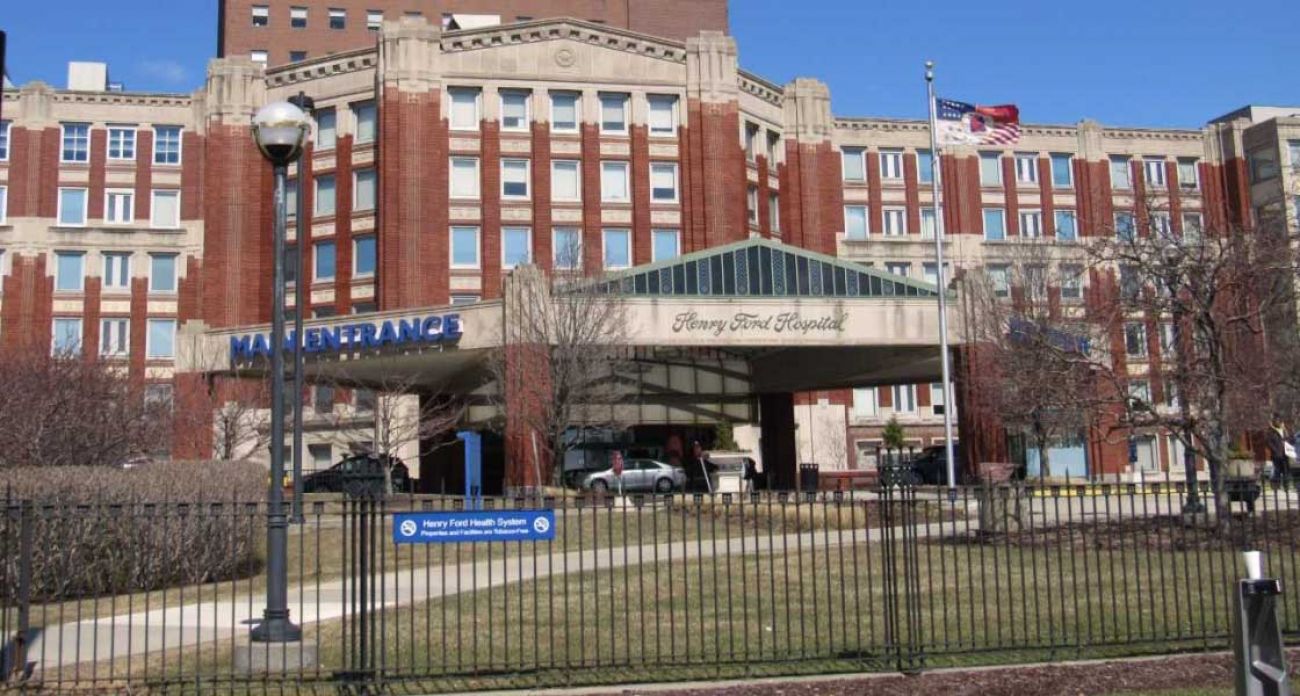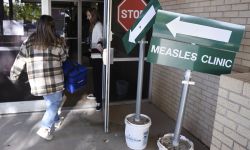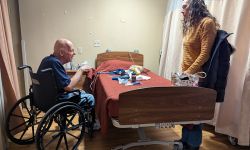Backlogged surgeries from coronavirus shutdown could take months to reschedule

Henry Ford Health System has a backlog of about 8,000 surgical procedures that were postponed when COVID-19 began to surge in metro Detroit.
The University of Michigan Health System estimates it has 12,000 such surgeries waiting to be scheduled.
At Beaumont Health, about 8,500 surgical procedures were delayed, along with 300-400 cardiac catheterizations and roughly 9,500 imaging procedures, such as CT scans MRIs and X-rays.
Gov. Gretchen Whitmer announced Thursday that starting May 29, health care providers can resume nonessential medical treatments and dental procedures.
Get involved
Detroit Free Press, Bridge Magazine and Michigan Radio are teaming up to report on Michigan hospitals during the coronavirus pandemic. If you work in a Michigan hospital, we would love to hear from you. You can contact Kristen Jordan Shamus atkshamus@freepress.com, Robin Erb at rerb@bridgemi.com or Kate Wells at Katwells@umich.edu at Michigan Radio.
But getting back to normal and catching up on all those backlogged appointments — like delayed mammograms, prostate exams, colonoscopies, knee and hip replacement surgeries, and other procedures — won't happen overnight, hospital officials warn.
"It's going to be many months," said Dr. Jeffrey Fischgrund, chief of clinical programs for Beaumont Health and chairman of the orthopedic department at Beaumont Hospital, Royal Oak. "I wish I could say it's three months. Realistically, I think it's going to be six months or more.
"I can tell you now we're not even at 50 percent of our normal volumes overall," he said, explaining that Beaumont shuttered ambulatory surgery centers in mid-March and shifted staffing and equipment like anesthesia machines to its main hospitals to manage the quickly rising caseload.
Reversing all that won't be simply or easy, especially given that the pandemic isn't over. Although the pace of new infections and hospitalizations has slowed, Michigan's Department of Health and Human Services continues to report new COVID-19 cases and deaths every day.
So health systems have to restart nonessential procedures with trepidation, knowing that at any point, there could be another surge in coronavirus cases.
"For at least the next year, there's going to be some patients in the hospital all the time that are COVID," said Dr. Michael Mulholland, executive director of the University of Michigan Medical Group and the senior associate dean for clinical affairs. "And we're going to need to reserve some space for them in case we have another resurgence.
"We're going to need to be really careful about how quickly we open back up."
The Ann Arbor-based hospital system is now scheduling some surgeries on Saturdays to try to absorb some of the 12,000 backlogged operations, and has created a tiered approach to determining which patients should be scheduled first, he explained.
"If we were just to go about it the old-fashioned way, the way we used to before, it would take us more than 20 weeks just to walk through that backlog without any new operations being scheduled," Mulholland said.
With the expedited plan in effect that includes Saturday surgeries, he said it'll likely take 16 weeks, rather than 20, to catch up.
"We put all of the most serious people at the front of the line," he said. "So I'll give an example of somebody who has cancer of the colon. That person goes to the front of the line. And somebody that needs a hip replacement because it's painful would be next in line, but if somebody needed a cosmetic operation, they'd be at the end of the line."
As health services resume, patients get relief
Many health systems have already resumed some procedures that weren't considered emergencies, but that couldn't be put off for long.
That was the case for Jim Bieri.
Bieri, who is 71 and lives in Grosse Pointe Farms, was diagnosed with kidney cancer at the end of February. Surgery to remove his tumor was scheduled for late March, just after COVID-19 shut down nonessential medical procedures in the state.
His procedure was postponed indefinitely, and Bieri worried: Would his tumor grow and spread without surgery to remove it? How long would he have to wait?
"It was malignant, and they gave me certain parameters of how big it was and how aggressive it was and other details that, you know, scare the crap out of you," said Bieri, an attorney and commercial real estate broker.
"It weighed like a weight, like you're carrying around a weight all the time. Nobody likes uncertainty and it just was scary and uncomfortable."
But as Beaumont Health began to see a slowing of new coronavirus admissions in mid-April, the hospital system started to schedule pressing cases like Bieri's procedure.
His tumor was removed April 17, and was graded stage 2 renal cancer.
"They thought it was stage 1, but it ended up being a 2, and it was a little bigger than they thought," he said.
"I'm glad somebody decided ... that I was a candidate to get it out, you know, even though there was limited surgeries going on. I was delighted that happened."
Sarah Germaine, 35, of Roseville couldn't wait long for her surgery, either.
She was diagnosed with invasive ductal carcinoma Feb. 11, and she and her doctors came up with a plan to remove the tumor in mid-March, and then start chemotherapy, followed by radiation.
But on the eve of Germaine's surgery, her doctor called with bad news.
Because of the skyrocketing number of cases of COVID-19 in the region, "She said, 'I don't think we should do a surgery. We need to postpone it.' "
Germaine's anxiety climbed as surgery was postponed one week, and then another.
Her doctor called again in late March, and told her they were ready to go through with it — even as the first wave of the pandemic was peaking in southeastern Michigan.
That added another element of worry to the situation: Germaine was afraid she might be exposed to the virus in a hospital setting.
"I was a little scared," she said. "But I have a couple of people in my family that are in the medical field. ... They were telling me 'Just get it done. Just do it now. We don't know how long this thing's going to go on for. We don't know how much worse it's going to get. So just do it. Get out of you so that it's not growing inside of you anymore.' And so I did.
"And I'm very happy, too, because it did grow a little bit. It was a little bit bigger than they initially thought."
Germaine spent the weeks after her surgery recovering while mostly staying home, trying to avoid any potential exposure to the virus. As a cancer patient, she knows she's at high risk for complications from COVID-19.
In the the last few days, doctors have implanted a port that soon will allow them to infuse her body with cancer-killing chemotherapy. Germaine also underwent an echocardiogram to ensure she's ready to continue with the next phase of her cancer treatment — one she'll have to face alone.
Because in the age of COVID-19, when doctors and hospitals have strict visitor restrictions to prevent the spread of the virus, she won't be allowed to have anyone by her side when she goes for her first chemo infusion.
"That's making it harder to deal with," she said. "My husband is not allowed to come with me to oncologist doctor's appointments. ... He can't come with me to chemo. He won't be able to come with me to radiation. I have to do like basically everything by myself. ... I think I'm more scared with the chemo than I was with the surgery."
A tiered approach helps set priorities
At Henry Ford Health System, hospital leaders are also taking a tiered approach to determining which patients should take priority for the roughly 8,000 procedures that were delayed by the pandemic.
The hope, said Dr. Adnan Munkarah, executive vice president and chief clinical officer, is to have everyone rescheduled by the end of June.
And like the University of Michigan, Henry Ford also is scheduling some of those operations on the weekends.
“We never stopped performing lifesaving surgeries for those who needed it the most,” Munkarah said. “What we’re finding now is that a condition that wasn’t considered time sensitive or urgent in March has now become more urgent. At the same time, we have new patients coming in with conditions that have to be scheduled.”
Since the pandemic began, Henry Ford doctors still were able to perform a heart transplant, two liver transplants and several craniotomies.
Dr. Steven Kalkanis, CEO of the Henry Ford Medical Group and chief of clinical academics at Henry Ford Health, said the health system is in its fourth week of ramping up time-sensitive surgeries, and in its first week of elective procedures.
"Not only have we turned the corner, but I think we are firmly in a recovery phase now," he said. "In many ways, the recovery phase is challenging, sometimes even more challenging logistically than when this crisis first hit us. But we are prepared. We've had significant lessons learned and our teams are ready. ... Our patients understand that. ... Safety is prioritized above all else."
Patients who come for surgery at Henry Ford, Kalkanis said, are tested in advance for COVID-19, to ensure they aren't asymptomic carriers or pre-symptomatic carriers of the virus.
The same is true at Beaumont and the University of Michigan, Fischgrund and Mulholland said.
And strict safety protocols are in effect at the hospitals to ensure patients are not exposed to the virus when they come in for treatment.
"Our COVID patients are only in COVID units," Fischgrund said. "The operating rooms now are only for patients that do not have COVID. Where they go after surgery has no COVID patients. The entrances and exits are separate. There's a lot more screening and testing going on now before surgery. Everybody wears the face mask. Everybody washes their hands at every opportunity. The amount of people allowed in the hospital is much less than before.
"But there's still a reluctance among many patients to come back to the hospital. And I suspect it's gonna take a long time for people to get over that."
Delayed surgeries finally start again
Dr. Mark Karadsheh, a surgeon specializing in knee and hip replacements with the Michigan Orthopedic Surgeons group, said COVID-19 pretty much shut down all the elective surgeries he performed for about six weeks.
"I was still able to do emergencies like hip fractures or infections, but nothing along the lines of an elective joint replacement or someone who just has ... arthritis at the hip or knee," he said.
And while it might not seem all that pressing, some people in need of hip- or knee-replacement surgery are in so much pain, it affects all aspects of their lives. Waiting can be excruciating.
Karadesheh resumed doing elective surgeries on the most severe patients in the last two weeks "because they didn't feel like they could make it much longer in their current condition," he said.
Among those patients was Ken Ratkovich, who is 72 and lives in Bloomfield Hills.
Ratkovich, who retired from a career in automotive engineering and finance, injured his left hip in 2007 when he fell from a ladder. He had to have surgery to repair it, and did very well for about a decade.
But, he said, that injury led to arthritis in the same hip, and by the end of 2019, he said, "I had a distinct limp and the pain on occasion was pretty sharp. ... It was painful."
Hip replacement surgery was initially scheduled for March 18, but had to be postponed because of the pandemic.
Karadesheh said he didn't want to wait too long to operate on Ratkovich.
"He had severe bone loss as a result of his arthritis, and it was almost to the point where if we would have waited any longer, the arthritis could have eroded through the remaining bone stock," Karadesheh explained.
"Potentially, it might have been a situation where a hip replacement would have been extremely difficult or near impossible if we didn't get to it very soon. So he was on my mind, on a list of patients that I really didn't want to let go any further just for fear that ... if he were to have eroded more bone that ... he would have had to live with it the rest of his life."
Karadesheh said that his surgical group uses strict criteria for determining who should be pushed to the front of the line and who should wait.
He said those who have significant pain and deterioration in the joint, like Ratkovich, tend to rise to the top of the list.
But he also considers whether patients have other health conditions, such as asthma, high blood pressure, obesity, or are immune-compromised, and asks those people to wait.
"Unfortunately, they are just going to have to wait," he said. "... They're just a little bit too high risk. ... If they, God forbid, got COVID, they would be in a situation where they could potentially end up in the ICU. Those types of patients, they are going to be delayed until we get ... better control of things."
Potentially, until there's a vaccine, Karadsheh said.
Ratkovich said his recovery "was beyond remarkable.
"After the procedure, I could stand up, and I had no discomfort in my hip at all. ... The discomfort in my hip and become like my friend. Pain was with me all the time. And that was no longer present."
He knew there was a risk to having surgery during the COVID-19 pandemic, but, he said, "there really isn't any precedent for this kind of situation.
"Everybody's got to grow accustomed to the fact that there's going to be this extra layer of tasks that you need to go through, ... a safety protocol involving masks and hand sanitizers and distancing."
But, he said, no one should avoid medical care or surgery for fear of contracting COVID-19 at the hospital.
"Nobody should be too scared about it," Ratkovich said.
See what new members are saying about why they donated to Bridge Michigan:
- “In order for this information to be accurate and unbiased it must be underwritten by its readers, not by special interests.” - Larry S.
- “Not many other media sources report on the topics Bridge does.” - Susan B.
- “Your journalism is outstanding and rare these days.” - Mark S.
If you want to ensure the future of nonpartisan, nonprofit Michigan journalism, please become a member today. You, too, will be asked why you donated and maybe we'll feature your quote next time!








